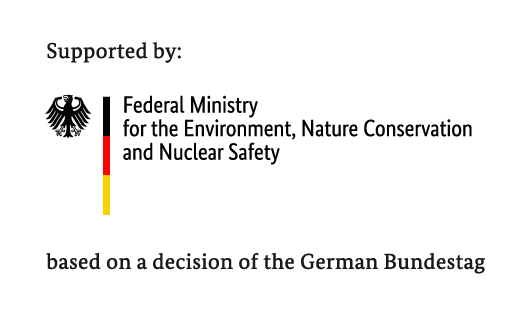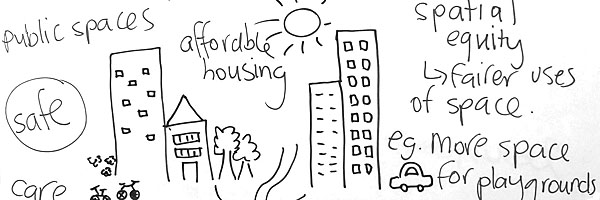

The project has been concluded with a well attended final online conference on 10 March 2022. If you wish to learn more, we invite you to see the final conference folder under GUCCI events. In addition, we offer selected materials from the project for download, and under RESOURCES, you can find our booklet "The Gender Assessment and Monitoring of Adaptation and Mitigation (GAMMA) methodology: a practical handbook on gender and urban climate policy".
Cities are key actors for the implementation of climate adaptation and mitigation policies therefore, the “Gender Into Urban Climate Change Initiative” explores options for integrating gender and social aspects into policies in several pilot cities.
It seeks to develop gender-responsive policy recommendations with the aim of empowering citizens with their participation in urban planning processes and implementation. The main goal of the project is to enhance the effectiveness, inclusiveness and acceptance of local mitigation and adaptation policies.
The first part of the project (2015-2018) was focused on cities climate policies. In the second phase of the project (2018-2021), the “Gender Assessment and Monitoring of Mitigation and Adaptation” methodology (GAMMA) will be also applied at the national level. The project had developed GAMMA in its first implementation phase and has tested it in six pilot cities already. Finally, recommendations will be prepared targeting higher-level decision-makers in regional and national government, national city associations and international city network.
The GAMMA methodology permits to examine local adaptation and mitigation policies for their gender responsiveness, seeking to identify gender entry-points and develop recommendations for interventions needed to address gender gaps in planning procedures, priorities, policies and measures.
Project outputs, such as the explanatory video, publications and reports, are available here.
The project was launched in 2015 and will run until 2021 and is part of the International Climate Initiative (IKI), supported by the German Federal Ministry for the Environment, Nature Conservation, and Nuclear Safety (BMU).
Read more about the project partners here.
GUCCI´s project is coordinated by GenderCC - Women for Climate Justice, in a partnership with Equidad de Género (Mexico), All India Women’s Conference (India), GenderCC Southern Africa (South Africa), Aksi! for gender, social & ecological justice and Solidaritas Perempuan (Indonesia).
For further information about the project please contact the Secretariat’s team.
Read stories from activities and events in the pilot cities here.
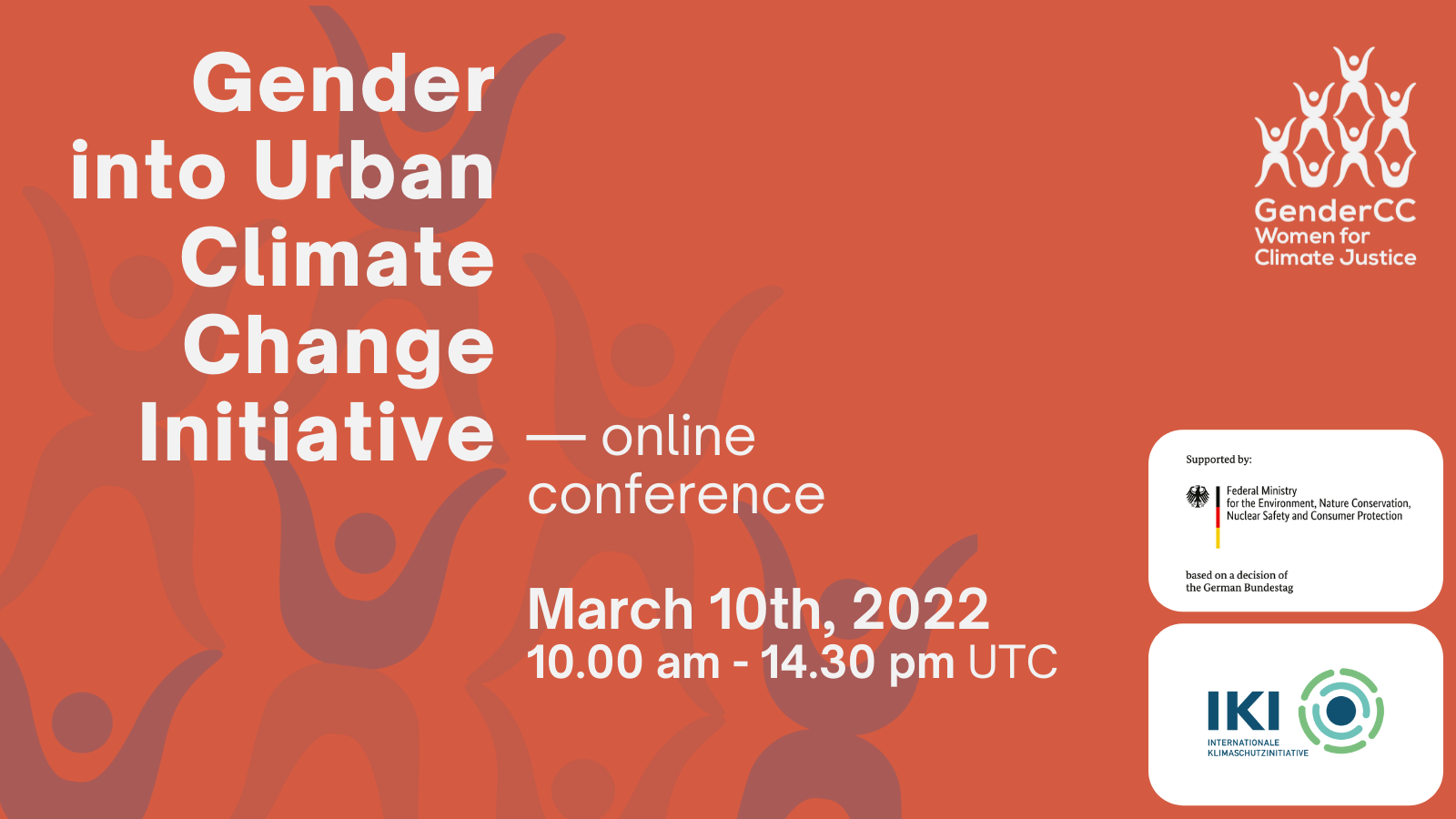
GenderCC–Women for Climate Justice e.V. is would like to thank all the interesting speakers, partners and stakeholders for a very interesting online conference on the results of the project “Gender into Urban Climate Change Initiative” on March 10th, 2022.
Please find the presentations of the speakers on the top right of this page under Downloads.
If you have missed the conference of would like to rewatch parts of it, please find the recording of the conference on Youtube.
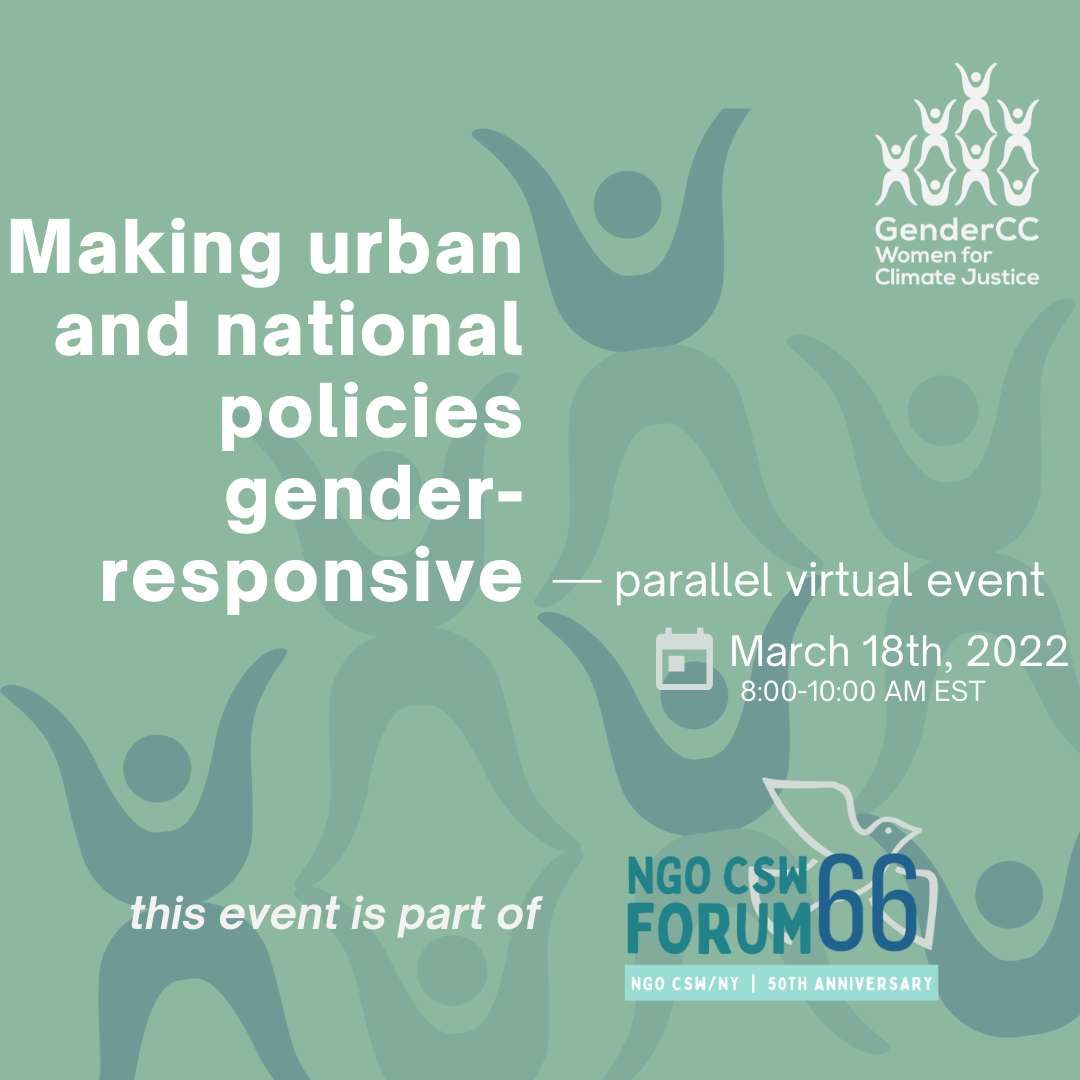
Dear all,
You are welcome to join GenderCC's CSW66 parallel event 'Making urban and national climate policy gender-responsive', in particular if you haven't been able to attend our conference last Friday. The programme is similar: Together with our partners, we'll report on the results of the project 'Gender into Urban Climate Change Initiative (GUCCI)', including an introduction into our Gender Assessment approach GAMMA, findings from India (AIWC), Indonesia (Aksi!), Mexico (Equidad de Género) and South Africa (GenderCC Southern Africa), as well as policy recommendations on how to integrate gender into urban and national climate policy.
We are hoping to see you online this Friday 18th March at 8:00-10:00 AM EST (13.00 - 15.00 CET).
Please register in advance for this meeting at
https://us02web.zoom.us/meeting/register/tZElf-ChqT4iGN02_gn9akHKEMsDLoKrCLfS
After registering, you will receive a confirmation email containing information about joining the meeting.
GenderCC–Women for Climate Justice e.V. is happy to share the preliminary agenda for the online conference presenting the results of the project “Gender into Urban Climate Change Initiative”.
Cities are key actors for the implementation of climate adaptation and mitigation policies. Yet, while the Paris Agreement is calling for the consideration of gender equality when taking action to address climate change, urban policies are still lacking of a gender perspective. Therefore, GenderCC’s “Gender Into Urban Climate Change Initiative” (GUCCI) has explored options for integrating gender and social aspects. In the conference, we will present our approach and the resulting recommendations for gender-responsive urban climate action, with the aim of empowering women’s organisations and civil society groups to get involved and push for both ambitious climate policy and the integration of social and gender aspects.
Date: March 10th, 2022
10.00 - 14.30 UTC
11.00 - 15.30 CET
Please register here for the conference.
| Programme | ||
| 10.00 – 10.20 | Dr. Birte Rodenberg GenderCC-Women for Justice | Welcome |
|
| Luisa Rölke Head of International Climate Policy Division, German Federal Foreign Office | Welcome Address |
|
| Gotelind Alber GenderCC–Women for Climate Justice | Introduction to the Project |
| 10.20 – 10.45 | Dorah Marema South African Local Government Association (SALGA) | Insights for a City Network in South Africa |
|
| Q&A |
|
| 10.45 – 10.55 | Short Break |
|
| 10.55 – 12.10 | Titi Soentoro Aksi! for gender, social and ecological justice, Indonesia | Gender Analysis Process (GAMMA) |
|
| Sruthi Raghavan All India Women’s Conference, India | Projects in Indian Pilot Cities |
|
| Ndivile Mokoena GenderCC–Southern Africa | Recommendations for Gender Responsive Climate Policies in South Africa |
|
| Q&A |
|
| 12.10 – 12.40 | Long Break |
|
| 12.40 – 13.30 | Denisse M. Vélez Martínez, Alma Rosa Colin Equidad de Género, Mexico | Advocacy for Gender in Urban and National Climate Policies in Mexico |
|
| Kalyani Raj All India Women’s Conference, India | Overall Outcomes and Recommendations from the Project |
|
| Q&A |
|
| 13.30 – 13.40 | Short Break |
|
| 13.40 – 14.15 | Judith Commenges Gender-Focal Point for Urban Planning, Infrastructure and Mobility, Zukunft – Umwelt – Gesellschaft (ZUG) gGmbH | Gender Strategy of the German International Climate Initiative (IKI) |
|
| Q&A |
|
| 14.15 – 14.30 | Gotelind Alber GenderCC–Women for Climate Justice | Conclusions and Outlook |
| 14.30 | End |
|
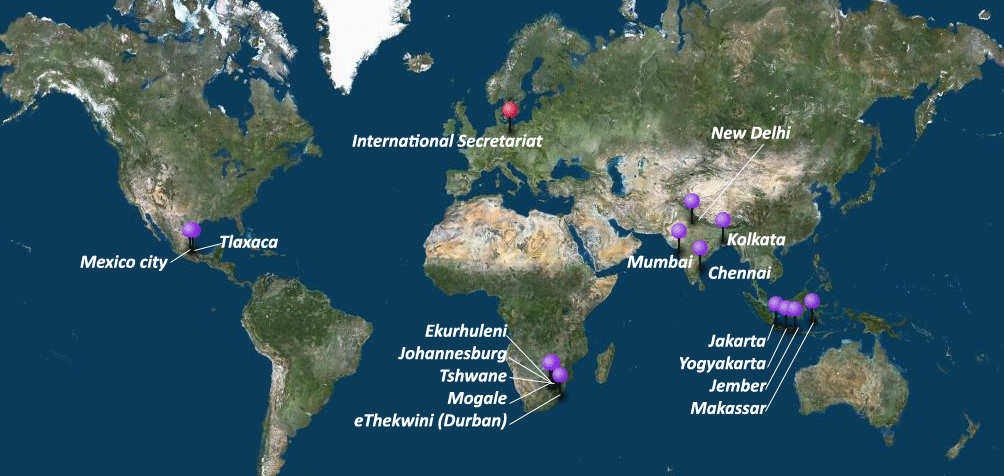
The project team participated in the UN Habitat's World Urban Forum 10 (WUF 10) in Abu Dhabi, from February 8 to 13, 2020.
GenderCC's 'Gender into Urban Climate Change Initiative' succesfully conducted the training event "Working towards gender-responsive urban climate policy: sharing tools to build inclusive, resilient cities", sharing experiences of the project with other civil society organisations and stakeholders, on Tuesday, February 11.
We also hosted the networking event "Working towards a gender-responsive urban climate policy: sharing experiences from GenderCC’s international urban pilot project and connecting with new partners" on Wednesday, February 12.
Both were implemented with our project partners Equidad de Género (Mexico), All India Women’s Conference (India), GenderCC Southern Africa (South Africa), Aksi! for gender, social & ecological justice and Solidaritas Perempuan (Indonesia).
You can read our full WUF10 report here.
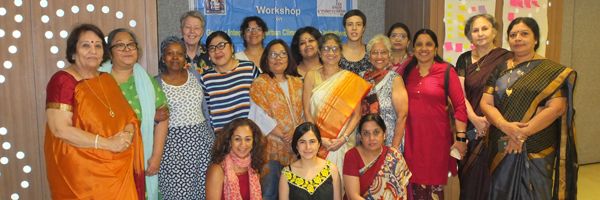
GenderCC held the international meeting of the “Gender into Urban Climate Change Initiative” (GUCCI) project in Mumbai, India, from 26 to 28 of February 2019. Hosted by the All India Women's Conference (AIWC), the meeting also brought together the project partners from Equidad de Género, ciudadanía, trabajo y familia from Mexico, GenderCC Southern Africa from South Africa, Aksi for gender, social and ecological justice and Solidaritas Perempuam from Indonesia and GenderCC’s international secretariat from Germany. Read the full report of the meeting here.
The project partnership has developed and is currently applying the 'Gender Assessment & Monitoring of Mitigation and Adaptation' (GAMMA) methodology in order to examine local adaptation and mitigation policies for their gender responsiveness, seeking to identify possible gender entry-points and to develop recommendations for interventions needed to address gender gaps in planning procedures, priorities, policies and measures. The assessment involves several steps, covering institutional setting and procedures, the complete range of a city’s climate policies and an in-depth analysis of the gender impacts of selected measures. The results of the assessment can be used to work with citizens and local policy-makers and encourage efforts to achieve a transformation towards a low-carbon, low-risk, climate-resilient, equitable, gender-just and inclusive city. In the course of the project, the partners will furthermore develop policy recommendations based on the results of GAMMA and implement concrete gender-responsive campaigns and projects in the pilot cities. A toolbox on how to apply GAMMA will be available soon.
Just as the linkages between climate change and gender are receiving a growing amount of attention, the specific challenges that cities face in light of climate change are also increasingly recognised. Yet, climate change, gender and cities are rarely addressed together, despite the clear potential for tackling inequality and climate issues with well-designed urban policies.
Together with UN Habitat and the GIZ (German Development Agency), GenderCC recently published one of the most comprehensive publications addressing this interface, which can be downloaded here.
Building upon this initial research, GenderCC launched a new project in collaboration with several partner organisations which will run from 2015-2020. The results of the "Gender into Urban Climate Change Initiative" will be featured on this page.
Watch the pictures of previous GUCCI activities in Indonesia, India, South Africa and during COPs. Find more photos here.
Since 2008, the International Climate Initiative (IKI) of the Federal Ministry for the Environment, Nature Conservation, and Nuclear Safety (BMU) has been financing climate and biodiversity projects in developing and newly industrialising countries, as well as in countries in transition. Based on a decision taken by the German parliament (Bundestag), a sum of at least 120 million euros is available for use by the initiative annually. For the first few years the IKI was financed through the auctioning of emission allowances, but it is now funded from the budget of the BMU.
The IKI is a key element of Germany’s climate financing and the funding commitments in the framework of the Convention on Biological Diversity. The Initiative places clear emphasis on climate change mitigation, adaption to the impacts of climate change and the protection of biological diversity. These efforts provide various co-benefits, particularly the improvement of living conditions in partner countries. The IKI focuses on four areas: mitigating greenhouse gas emissions, adapting to the impacts of climate change, conserving natural carbon sinks with a focus on reducing emissions from deforestation and forest degradation (REDD+), as well as conserving biological diversity.
New projects are primarily selected through a two-stage procedure that takes place once a year. Priority is given to activities that support creating an international climate protection architecture, to transparency, and to innovative and transferable solutions that have an impact beyond the individual project. The IKI cooperates closely with partner countries and supports consensus building for a comprehensive international climate agreement and the implementation of the Convention on Biological Diversity. Moreover, it is the goal of the IKI to create as many synergies as possible between climate protection and biodiversity conservation.
